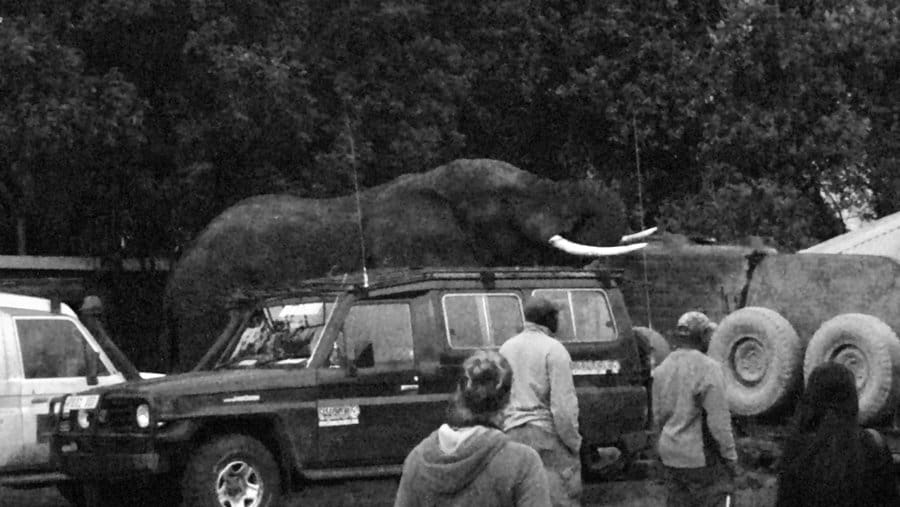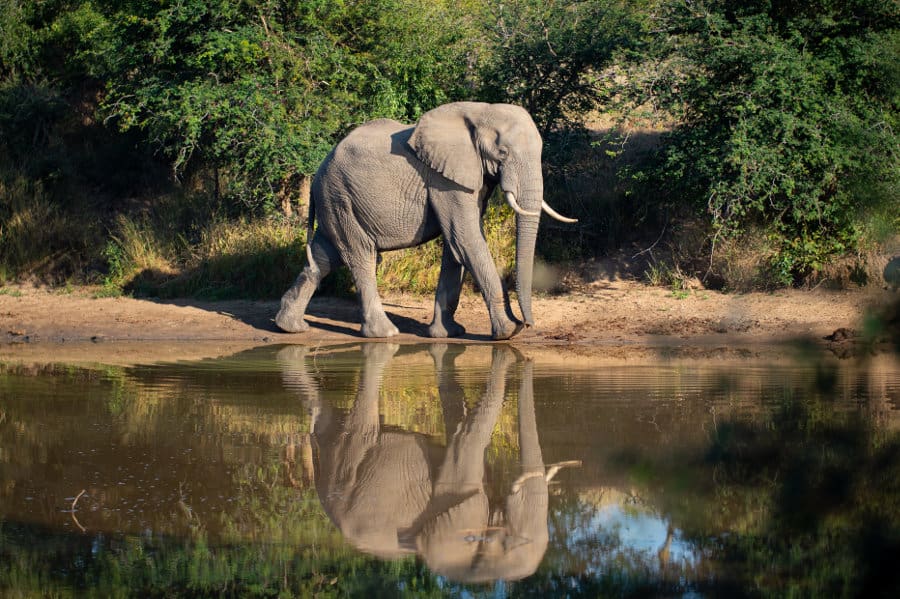Elephants are the largest land mammals on the planet. Thus, it is safe to assume that elephant dung would be of considerable size too.
These gentle giants can feed for up to 18 hours a day. That means that elephants eat roughly 75% of the time. They can consume around 180 kg per day – which means a lot of elephant poop.
So, how much does elephant poop weigh exactly? The average adult elephant can produce up to 100 kg of dung in a single day. To put it in perspective, the average giant panda weighs 100 kg!
What is elephant dung used for? Keep reading for some surprising elephant poop facts on how it’s used.
1. Burn Elephant Poop to Repel Insects
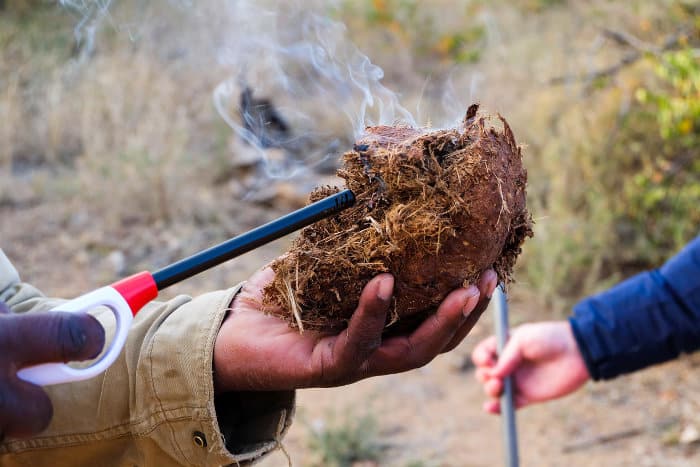
The African bushveld is an amazing place to spend the night in a tent. Yet, mosquitoes and other insects love to take their chances at night. What happens if you don’t have insect repellent?
Luckily, you do not need to rub elephant poo on yourself. By burning a dried-up piece of dung, you can chase away most of the buzzy buggers. Most people say that it does not produce a strong smell. In fact, the commercial repellents are way smellier.
The next time you find yourself in the bush without bug spray, find the driest elephant dung near you and light it up.
2. Emergency Water
This is not an everyday use for elephant dung. Unless you are in an emergency situation (or your name is Bear Grylls), you do not have to drink dung water.
At first, it doesn’t sound very safe. However, there is very little bad bacteria in elephant dung. The chance that you get ill is far less than your chance of surviving dehydration.
Start by wringing the water and fluids from the pile of dung. You can dry the rest of the poop and use it for other survival purposes. Then drink the remaining fluids that you collected.
3. Natural Pain Relief
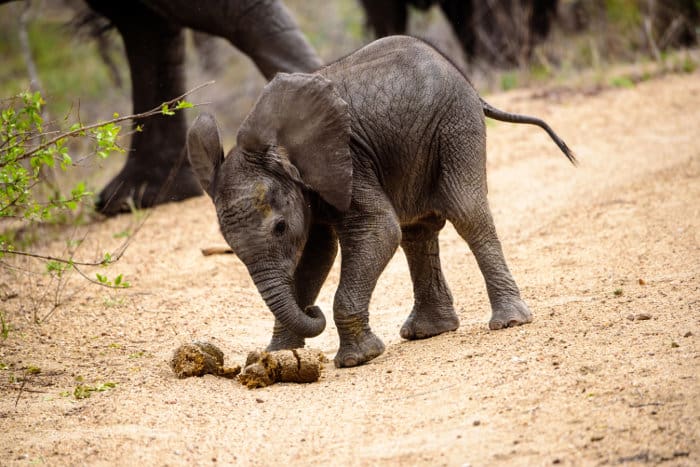
Elephants are herbivores that eat a large amount of fruits and foliage. Traditional healers use the very same fruits and foliage in natural remedies.
Elephant excrement is a great pain-relief medicine. If someone has any sort of pain, that person can burn elephant dung and inhale the fumes. This works well for headaches and toothaches. The process also works to stop nose bleeds and unblock your sinuses.
For more natural remedies regarding sinuses and pain relief, read all about the miracle that is the marula fruit.
4. Biodegradable Paper
Although elephants eat enough for a small family, they can only digest about 45% of their food. That means, 55% of their food passes through their digestive system intact.
The fibrous plant material found in elephant dung is perfect for making paper. People press the fibers into a pulp, which is like wood fiber pulp, used for making normal paper.
The average elephant can produce 115 sheets of paper per day. This paper does have a different texture to normal paper. However, this is a small price to pay for the good health of the planet.
5. Elephant Poop Coffee
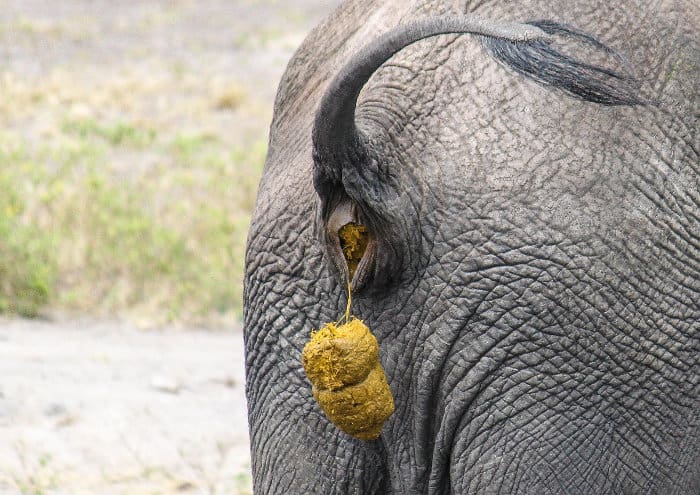
This may sound awfully similar to a previous trend in Southeast Asia: cat coffee. The digestive tracts of the civet cats are useful in breaking down the coffee beans. Then, someone brews those beans to create your cup of coffee.
In Thailand’s Golden Triangle, someone is feeding elephants coffee beans. Those coffee beans undergo fermentation in the elephants’ stomachs. This brings out the sweet chocolatey and cherry flavors of the coffee.
This special brew’s name is Black Ivory Coffee. It sells for around $500 a pound and the only shop outside of Asia that sells it is in Texas.
6. Eccentric Elephant Beer
This bizarre beer borrows from the same process used for making Black Ivory Coffee. The excreted coffee beans undergo alcoholic fermentation.
It was first successfully brewed into beer by the Sankt Gallen Brewery. The flavors of the beer are similar to the coffee. Bitterness gives way to sweetness, with a slight hint of chocolate.
People say that the aftertaste of the drink is more like an afterglow. In fact, it was so successful that all stocks of the beer sold out online within minutes of its initial launch.
7. Renewable Energy Source
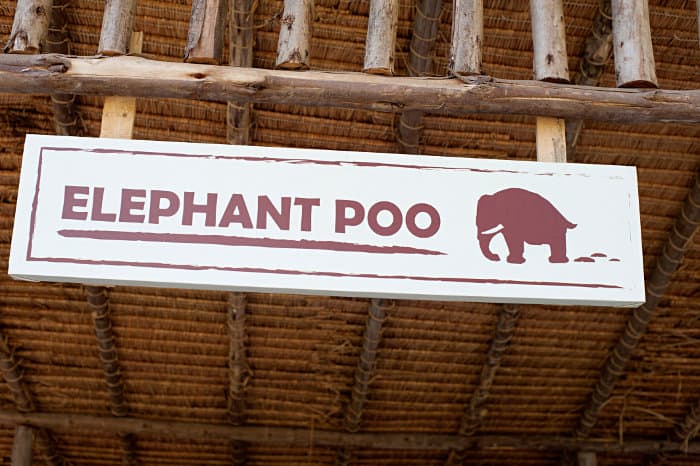
As the world’s fossil fuels deplete, people are desperate for long-term alternatives. One of these alternatives are biogases produced from animal waste.
As it turns out, elephants are a great source of biogas. This is due to their herbivorous diet and the large amounts that they excrete daily. Their dung produces gas for stoves, heat and can even generate electricity.
Biogas digesters break down elephant manure. The by-products of this process are methane and carbon dioxide. Scientists collect these gaseous by-products and use them in stoves or gas-powered engines.
8. Natural Commodity
Scientists like to call elephants ‘ecosystem engineers’. This is because they have the ability to change the environment and control the available resources for other organisms.
Many insects rely on elephant turds for their homes or food. Dung beetles alone use it as a home, a breeding ground or they simply bury it.
The dung and its crowds of yummy insects attract many amphibians, like frogs for example. Other animals, like meerkats and badgers, also scavenge elephant feces for tasty morsels.
Apart from being a precious resource to many animals, it is also valuable to the soil as a fertilizer.
Be Inspired By Elephant Dung

From natural medicine to warm brews, it’s clear that elephant dung is versatile. Now that you know how many uses elephant dung has, go out and experiment with it. Who knows, you could discover even more uses for it.
Even though elephants are so large, you can only find them if you know where to look. Africa is a large place and the easiest way to spot animals (and their dung) is on safari.
Lucky for you, there are all kinds of African safari deals available. So pack your bags and book your flight to Africa now!

